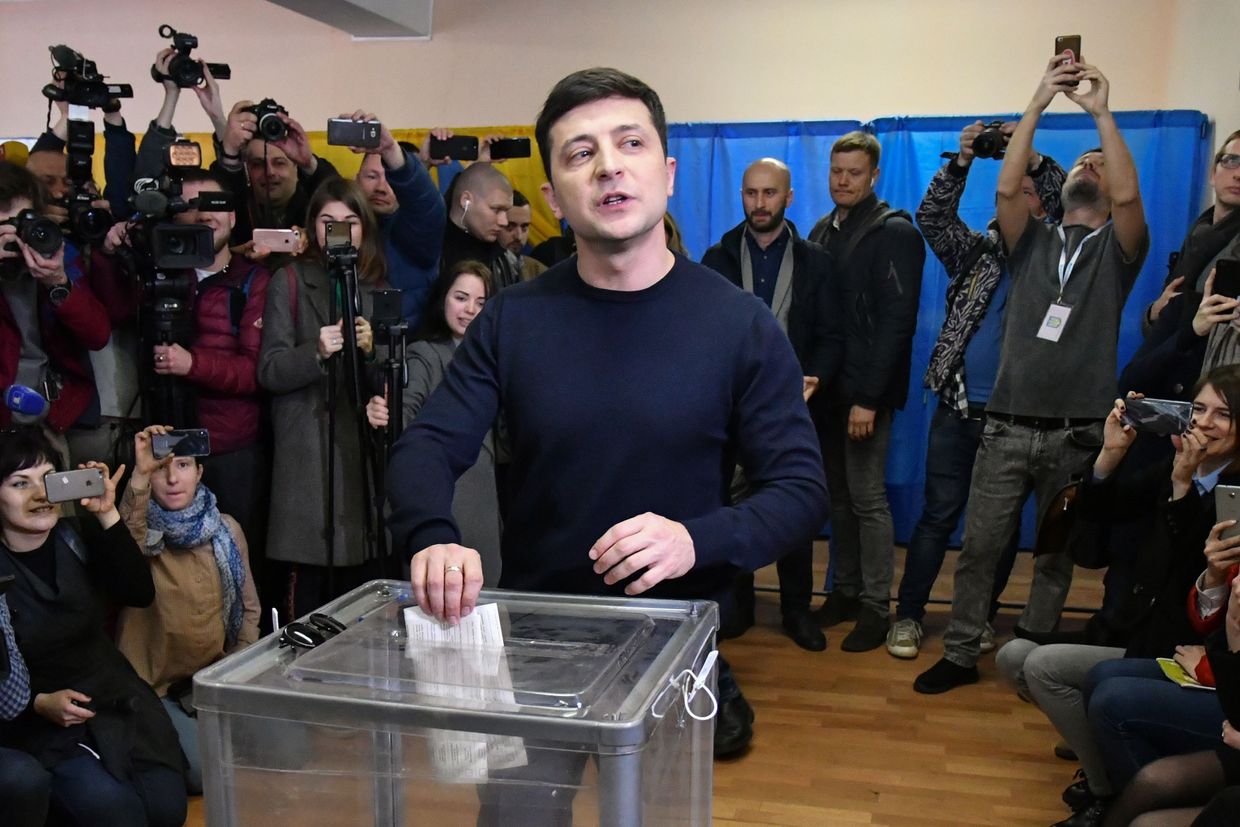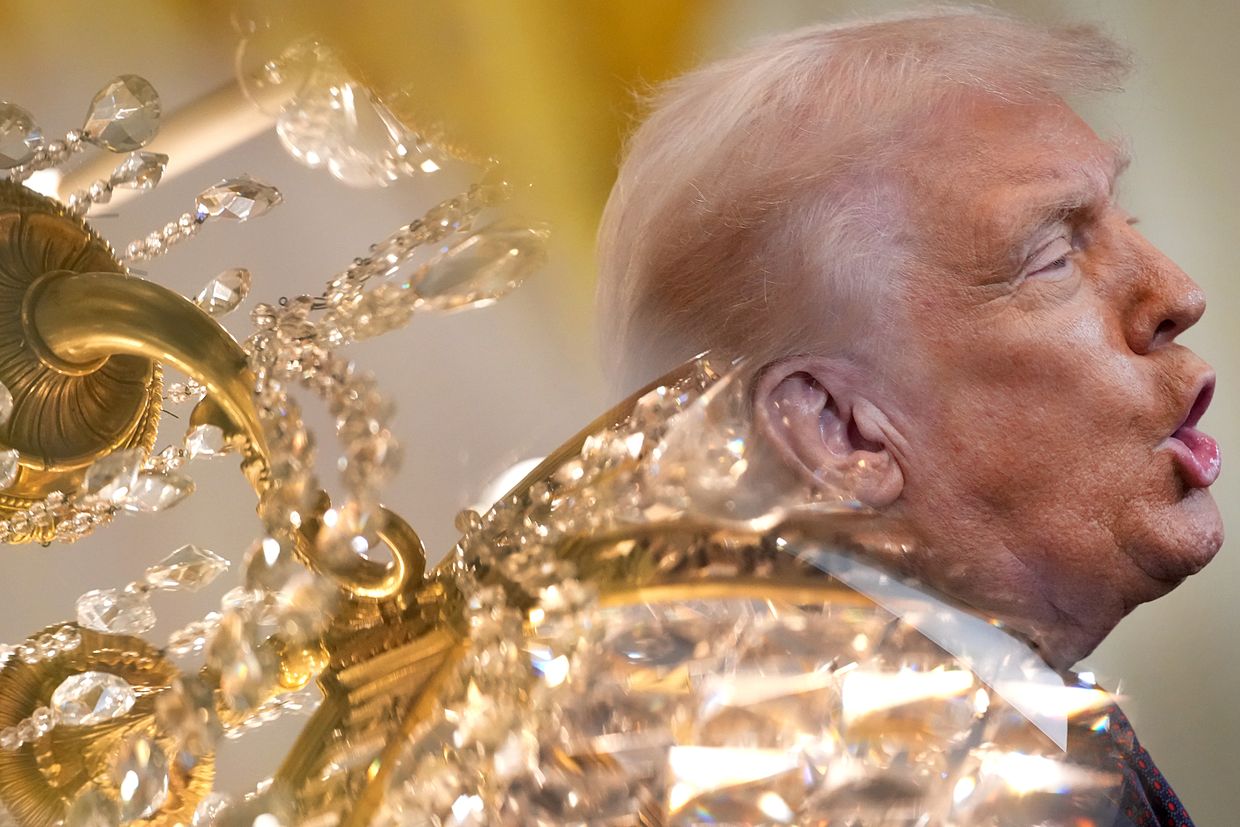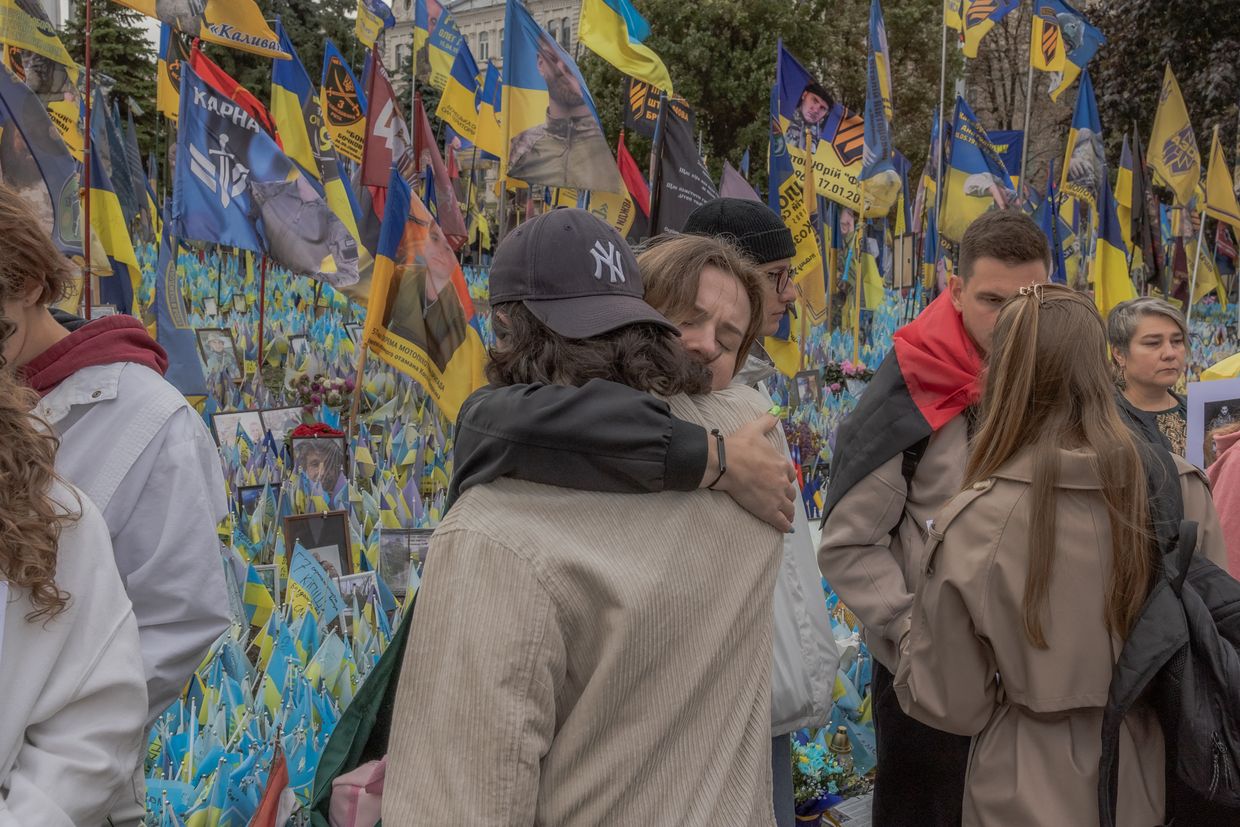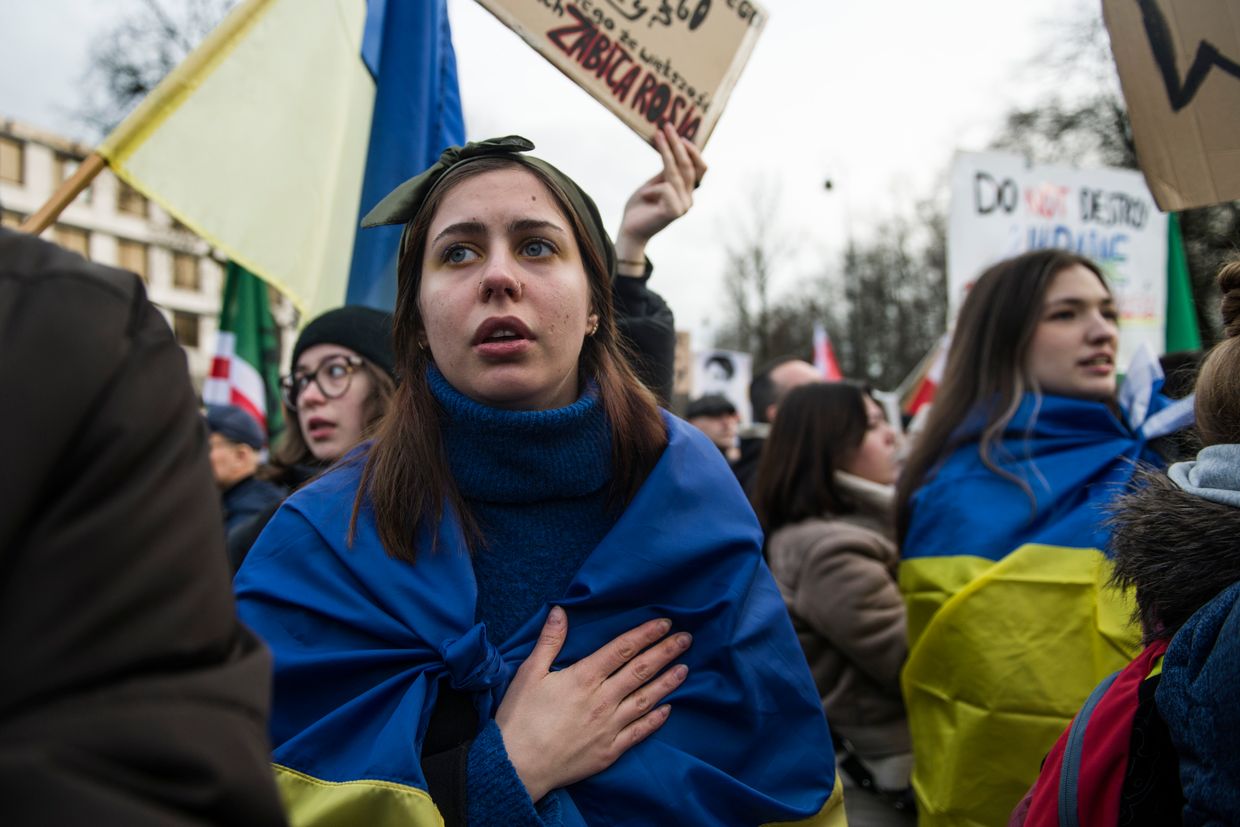Ukraine war latest: Russia wants to declare 'victory' over Ukraine on Feb. 24, Ukrainian intel claims

Key developments on Feb. 21:
- Russia wants to declare 'victory' over Ukraine on Feb. 24, Ukrainian intel claims
- Zelensky is not 'important' to negotiations on ending war, Trump says
- 'No appetite' for new Ukraine aid bill, US House speaker says
- Trump's envoy Kellogg praises Zelensky as 'courageous leader' after talks
- Russia may offer frozen assets for Ukraine's reconstruction, demand funds for occupied territories, Reuters report
- Ukraine launching faster drone supply model for military
Russia is instructing its propagandists to declare "victory" in the war "against Ukraine and NATO" on Feb. 24, the third anniversary of its full-scale invasion, Ukrainian military intelligence (HUR) claimed on Feb. 21.
After Russia failed to take over Ukraine within days in 2022 and suffered several defeats in 2022, the Kremlin began to push the false claim that Russia was at war with NATO.
Western partners have been providing Ukraine with weapons since the beginning of the all-out war but have never sent troops to Ukraine, fearing escalation.
The General Staff of Ukraine's Armed Forces reported in its daily update on Feb. 21 that Moscow had lost 864,860 troops in Ukraine since February 2022, including 1,280 casualties Russian forces suffered just over the past day.
According to Ukraine's intelligence agency, Russia now aims to sow despair among Ukrainians, destabilize the situation in the country, and discredit Ukraine among its allies.
Russian intelligence services plan to spread the narrative that "Ukraine has been betrayed" by the West and the U.S., HUR claimed. Russian propaganda will also keep on questioning the legitimacy of President Volodymyr Zelensky and "the corrupt Ukrainian officials who steal U.S. aid."
Ukraine's allies had generally ignored a propaganda narrative about Zelensky's legitimacy until U.S. President Donald Trump accused Ukraine of starting the war and appeared to echo the Kremlin's lines, dubbing Ukraine's president as a dictator.
This claim ignores the fact that it is impossible to hold elections during martial law, which has been in effect since Russia's full-scale invasion began in 2022. As a result, Zelensky's term has been extended, which constitutional lawyers argue is permitted under Ukrainian law.
HUR says that the Kremlin may use the recent U.S.-Russia talks in Saudi Arabia to impose its terms of peace on the world, trying to portray governments in Europe that back Kyiv as "enemies of peace."
No concrete decisions were announced following the meeting between American and Russian delegations, but Ukraine's exclusion sparked alarm in Kyiv and Europe.
Echoing HUR's warnings, the Security Service of Ukraine (SBU) pointed to mounting cases of Russia's informational and psychological operations aimed against Ukraine.
Using bot farms and fake social media accounts, Russian intelligence services aim to divide Ukrainian society and call for public order disruptions, the SBU said.
Zelensky is not 'important' to negotiations on ending war, Trump says
U.S. President Donald Trump claimed on Feb. 21 that President Volodymyr Zelensky is not essential to negotiations to end Russia's war in Ukraine.
"I don't think he's very important to be at meetings, to be honest with you," Trump told Fox News Radio on Feb. 21. "When Zelensky said, 'Oh, he wasn't invited to a meeting,' I mean, it wasn't a priority because he did such a bad job in negotiating so far."
Trump's remarks come amid growing concerns in Kyiv and among European allies about Washington's shifting stance on the war, particularly after the U.S. held direct talks with Russia in Saudi Arabia on Feb. 18. Zelensky on Feb. 16 rejected the idea of peace negotiations being conducted behind Ukraine's back.
Trump has also made multiple false claims about Ukraine in recent days, including calling Zelensky a "dictator" and accusing him of refusing to hold elections.
His remarks ignore the fact that Ukraine's constitution prohibits elections during martial law, which has been in effect since Russia launched its full-scale invasion in 2022.
Trump's special envoy for Ukraine, Keith Kellogg, said on Feb. 15 that Europe will not be directly involved in negotiations to end Russia's war in Ukraine, but its interests will be considered.
Trump said on Feb. 20 that Russia "holds the cards" in any peace talks due to its control over a significant portion of Ukrainian territory.
He further announced plans to meet Russian President Vladimir Putin in Saudi Arabia, though the extent of Ukraine's involvement in those talks remains unclear.
Moscow has positioned the U.S. as its "main counterpart" in negotiations, Kremlin spokesperson Dmitry Peskov said on Feb. 13.
On Feb. 18, Trump appeared to place responsibility for the ongoing war on President Volodymyr Zelensky's wartime leadership.
U.S. Vice President JD Vance also criticized Zelensky on Feb. 19, calling his public remarks about Trump "counterproductive" after the Ukrainian president dismissed Trump's claim that his support in Ukraine had fallen to 4%, labeling it Russian disinformation.
A Feb. 19 poll by the Kyiv International Institute of Sociology (KIIS) showed that 57% of Ukrainians trust Zelensky, marking a five-point increase since December.
'No appetite' for new Ukraine aid bill, US House speaker says
There is no appetite for another assistance bill for Ukraine, U.S. House Speaker Mike Johnson said in an interview with Newsmax on Feb. 20 amid growing tensions between Washington and Kyiv.
U.S. President Donald Trump has pushed to mediate a peace agreement between Ukraine and Russia while using increasingly hostile rhetoric toward Kyiv. After accusing Ukraine of starting the war, Trump dubbed President Volodymyr Zelensky a "dictator without elections."
"We have to bring (the war) to an end. And I can tell you that our European allies understand the necessity as well. It's (dragged) on too long," Johnson said.
Johnson, a Republican and staunch Trump supporter, has served as the speaker of the U.S. House of Representatives since October 2023. He delayed aid to Kyiv for six months by refusing to hold a vote on various iterations of a $61 billion foreign assistance bill but eventually reached a deal to pass the legislation in April 2024.
The speaker voiced support for the U.S. president, saying he is "the brute force" that can end Russia's full-scale war against Ukraine.
Trump's plan to end the war remains unclear. His special envoy for Ukraine and Russia, Keith Kellogg, said the war could end this year, pledging to "engage all parties" within 180 days to achieve this.
American and Russian delegations met in Saudi Arabia on Feb. 18. No concrete decisions were announced following the talks, but Ukraine's exclusion from the meeting sparked alarm in Kyiv and Europe.
Unofficial U.S. and Russian representatives have also reportedly been quietly meeting in Switzerland in recent months for informal discussions regarding Ukraine.
Trump's envoy Kellogg praises Zelensky as 'courageous leader' after talks
U.S. President Donald Trump's special envoy for Ukraine, Keith Kellogg, lauded on Feb. 21 "positive discussions" he held with President Volodymyr Zelensky a day earlier.
"A long and intense day with the senior leadership of Ukraine," Kellogg said on X after his meetings with Zelensky and top Ukrainian officials in Kyiv this week.
"Extensive and positive discussions with (President Volodymyr Zelensky), the embattled and courageous leader of a nation at war, and his talented national security team."
Kellogg's appraisal of Zelensky stands in stark contrast to recent statements from the White House. Earlier this week, Trump has denounced the Ukrainian president as a "dictator without elections" who is doing a "terrible job."
Trump's aides have linked his displeasure to Kyiv's reluctance to sign the U.S.-proposed deal on Ukraine's natural resources and to Zelensky's statement that the U.S. president lives in a "disinformation space" after refuting some of his false claims.
Zelensky and Kellogg held a bilateral meeting on Feb. 20. Even though the expected joint press conference was canceled at Washington's request, the Ukrainian president said the meeting "restored hope."
"And we need strong agreements with America — agreements that will really work," Zelensky added.
Axios reported on Feb. 20 that after Ukraine refused to sign the natural resource agreement due to a lack of security guarantees, the Trump administration presented an "improved" draft that was likely to be accepted by the Ukrainian side.
Russia may offer frozen assets for Ukraine's reconstruction, demand funds for occupied territories, Reuters reports
Russia may be willing to use a portion of its $300 billion in frozen assets to help rebuild Ukraine as part of a potential peace deal but insist that some of the funds be allocated to occupied territories, Reuters reported on Feb. 21, citing sources familiar with the matter.
The discussions reportedly come amid negotiations between U.S. and Russian officials following their Feb. 18 meeting in Saudi Arabia. It is unclear whether the frozen assets were discussed during the talks.
According to Reuters, one of the sources said Russia could agree to allocate up to two-thirds of frozen assets for Ukraine's reconstruction, provided accountability guarantees.
The remaining funds, Moscow reportedly insists, would go toward rebuilding Russian-occupied territories in eastern Ukraine, which the Kremlin claims as part of Russia.
Another source noted that, while Moscow appears open to using the frozen assets, the distribution of funds and the allocation of reconstruction contracts remain key points of contention.
A separate Kremlin-linked source, not directly involved in negotiations, said Russia still demands a gradual easing of sanctions and the full release of its frozen assets.
Following Russia's full-scale invasion of Ukraine, over $300 billion in Russian central bank reserves were frozen, with most — 191 billion euros ($198 billion) — held in Belgium's Euroclear depository.
The G7 has previously announced that these funds will remain frozen until Russia pays for the destruction it has caused in Ukraine.
The EU has already begun leveraging proceeds from frozen Russian assets to support Ukraine. In January, Ukraine received 3 billion euros ($3.09 billion) as part of the EU's Ukraine Facility, funded through interest earned on the frozen reserves.
The U.S. and G7 partners have pledged nearly $50 billion in loans to Ukraine, backed by revenue from Russian assets.
Russian President Vladimir Putin declared the illegal annexation of Ukraine's Zaporizhzhia, Donetsk, Luhansk, and Kherson oblasts on Sept. 30, 2022.
Moscow's latest position signals a potential shift in its approach to post-war financial settlements but underscores its continued insistence on legitimizing its occupation of Ukrainian territories.
Ukraine launching faster drone supply model for military
Ukraine's Defense Procurement Agency is launching a new supply model for delivering drones to the front line within weeks rather than months, Defense Minister Rustem Umerov announced on Feb. 20.
Kyiv has ramped up domestic drone production over the past year. Various aerial, naval, and ground drones have been developed and often successfully used for reconnaissance, combat, and other tasks throughout the full-scale with Russia.
According to the new model, military units will be able to choose the unmanned systems best suited to their needs. The system also aims to support manufacturers through advance orders, allowing them to plan for scaling up their production.
The model aims to boost transparency in procurement as it establishes clear supply mechanisms and stimulates competition.
The structure is based on the DOT-Chain, an IT system already used by the State Rear Operator (DOT), an agency dealing with non-lethal procurement for the military.
DOT-Chain is designed to streamline and digitize procurement processes while reducing delivery time.
"Together with manufacturers, we are working to ensure that no soldier waits for weeks or months for what they need," Umerov said after a meeting with representatives of 200 drone manufacturers.
Note from the author:
Ukraine War Latest is put together by the Kyiv Independent news desk team, who keep you informed 24 hours a day, seven days a week. If you value our work and want to ensure we have the resources to continue, join the Kyiv Independent community.
















